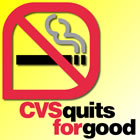|
CVS To Stop Selling Cigarettes and Tobacco at a Cost of $2 Billion Annually
"Simply the right thing to do for the good of our customers and our company"
CEO: "Tobacco products have no place in a setting where health care is delivered"
Company to launch national smoking cessation program in Spring
|
 |
February 5, 2014 -- CVS/pharmacy made an extraordinary announcement today: the company has decided to stop selling cigarettes and all tobacco products by October 1 of this year. As stated by Larry Merlo, President and CEO of CVS, "Tobacco products have no place in a setting where health care is delivered."
Such a decision does not come cheaply. CVS reportedly has revenue of $1.5 billion in sales of tobacco products annually; it is estimated that this decision actually will cost the company over $2 billion, because of lost sales of non-tobacco products that often accompany cigarette purchases.
As outlined in various company statements and in a Viewpoint article, published online today in the Journal of the American Medical Association (JAMA), CVS sees a fundamental change occurring in the role of the pharmacy. As stated in the JAMA article, co-authored by Dr. Troyen A. Brennan, Chief Medical Officer for CVS Caremark and Dr. Steven A. Schroeder, Director of the Smoking Cessation Leadership Center at UCSF:
"Responding to the overall shortage of primary care practitioners in the United States and to recent legislation that expands access to health care coverage, most pharmacy chains are retooling themselves as an integral part of the health care system. They are offering more counseling by pharmacists, an array of wellness products, and outreach to clinicians and health care centers. For example, Rite Aid has developed a new wellness-store format, and Walgreens is testing a "health and daily living" design. In this context, the sale of tobacco products seems contradictory, especially because pharmacists can provide nicotine-replacement distribution and counseling. Moreover, the usual excuses for selling tobacco products in pharmacies, such as avoiding sales to minors and keeping cigarettes behind the counter, become much less convincing as pharmacies expand their role in health care.
"Perhaps more important, pharmacies are moving into the treatment arena with the advent of retail health clinics. More than 1600 such clinics are operated by Walgreens, CVS Caremark, Rite Aid, Target (which does not sell cigarettes), Walmart, and many chain grocery stores. The clinics are designed to offer an alternative to routine care by office-based physicians. Yet nowhere else in health care are tobacco products available in the same setting where diseases are being diagnosed and treated. These retail clinics, originally designed to address common acute infections, are gearing up to work with primary care clinicians to assist in treating hypertension, hyperlipidemia, and diabetes—all conditions exacerbated by smoking."
While most people are aware that smoking is a major cause of lung cancer, not as many are aware of the vast impact that smoking has on heart disease, as well as other related health problems. Of course, smoking cigarettes is an addiction, not dissimilar to any other addiction. To its further credit, CVS announced that it plans to institute a smoking cessation program this Spring, to help wean customers from smoking. And such programs have been effective. In 1965, 42% of U.S. citizens smoked; today only 18% are smokers. Yet the rate of reduction in smoking prevalence has stalled in the past decade: 42 million people continue to smoke and 16 million current and former smokers have smoking-related illnesses.
February has been declared as "American Heart Month." So this announcement from CVS is extremely welcome. Hopefully it will be followed by similar announcements fro m Walgreens, Rite-Aid, Wal-Mart, and Costco.
Reported by Burt Cohen, February 5, 2014 |

